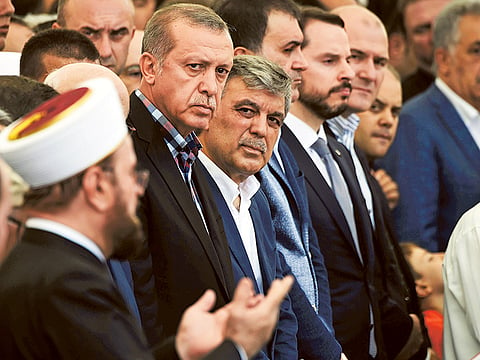Erdogan expected ‘to tighten his grip on troubled country’
He will use the opportunity ‘to finish up what he wanted to do from the beginning’

Los Angeles: Turkish President Recep Tayyip Erdogan has apparently put down a clumsy military coup, but the fallout, as he punishes those who challenged his government, will plunge Turkey’s domestic politics into new turmoil.
His enemies said they were challenging Erdogan because of his efforts to consolidate and enhance his own power, weaken opponents and inject a more Islamic flavour into secular Turkish institutions. With the failure of the coup, Erdogan emerges stronger than ever and is likely to become an even greater authoritarian, to the detriment of Turkish democracy, analysts say.
The Erdogan government blamed the rebellion on a Turkish Muslim theologian living in exile in Pennsylvania, and demanded that the US extradite him. Failure to do so would be viewed as an act of hostility, the government said.
Analysts said the shoddy conduct of the attempted overthrow ultimately plays into Erdogan’s hands and will allow the president to tighten his grip on politics and society. Turkey has censored, harassed or arrested journalists, politicians from the Kurdish minority and numerous voices of criticism of Erdogan.
“It is clear that he is going to use this opportunity to finish up what he wanted to do from the beginning,” said Henri Barkey, a Turkish scholar who heads the Middle East programme at the non-partisan Wilson International Centre for Scholars in Washington. He spoke by telephone from Istanbul.
“He will consolidate his power. He feels emboldened,” Barkey added, but cautioned that there were too many uncertainties still to predict exactly how events will play out. “Things are going to get bumpy.”
The coup was “a head-on targeting of Erdogan,” said Aykan Erdemir, a former Turkish opposition lawmaker and current fellow at the Washington-based Foundation for Defence of Democracies. Even though resolved, it will take a damaging toll on Turkey’s economy and domestic dynamics, Erdemir said.
“This is going to hit Turkish markets badly and hit Turkish democracy badly,” Erdemir said. “It will destabilise the country and erode trust in institutions.”
Many in Turkey suspect Erdogan was already planning to purge the judiciary and other branches of government of suspected followers of Fethullah Gulen, the exiled theologian.
At an extraordinary meeting, the Supreme Board of Judges and Prosecutors, Turkey’s highest judicial administrative body, laid off and ordered the arrest of 2,745 judges, 11 prosecutors and 10 Court of Appeals members, and issued warrants for the arrest of 140 others, the semi-official Daily Sabah reported.
The most prominent judges to be detained were Alparslan Altan and Erdal Tercan, both members of the Turkish constitutional court, now being questioned over suspected involvement in the coup attempt, a presidential spokesman said.
Both the military and part of Turkey’s judiciary had been the stiffest opponents to Erdogan’s gradual expansion of his own power and imposition of more Islamic tradition in public life and institutions — the coup plotters’ stated motive for their actions.
Sign up for the Daily Briefing
Get the latest news and updates straight to your inbox



